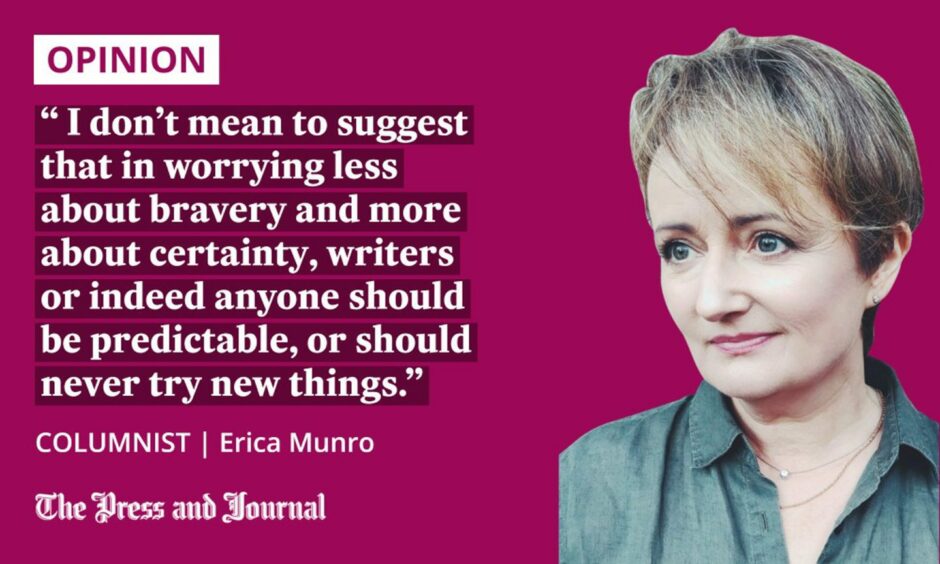Before the pandemic I used to love going to writers’ groups and workshops. I enjoyed the warmth of our shared passion for writing, the thrill of praise, the gentle and not-so-gentle criticism, the coffee and biscuits and the general buzz of creativity.
There would often be fun, brain-stretching prose exercises, such as using postcards as inspiration prompts, writing descriptions without adjectives, experimenting with poetry forms like haikus, sonnets or sestinas, creating an imaginary character or – still one of my finest works – telling a story told from the viewpoint of a broody hen.
I’ve participated in enough classes, read enough how-to books and listened to enough critics, reviewers and even authors to know that in order to produce good writing, writers are apparently expected to be fearless. We are encouraged to leave it all on the page, to push boundaries, to provoke, to disrupt, to interrogate, to explore strange new worlds, to boldly go where no man has gone before. It’s exhausting.
No wonder there’s a thing called writers’ block. I suspect that if writers worried less about pushing boundaries and more about clarity and paying attention to the basics (see the split infinitive, above), we’d get a lot more done.
Of course context is important. A persuasive essay, for example, must by definition try to convince the reader of a particular viewpoint, likewise a legal argument. Plays should be riddled with unpredictability, questions and conflict. But when I’m reading for pleasure, I’d rather get lost in the words than lost in the woods, browbeaten by the author’s ground-breaking hot take. I think most readers feel this way too, so why are writers schooled into believing otherwise?
David Bowie’s approach sounds thrilling – but should we all venture into new territory?
What does it mean, anyway, to write fearlessly?
Let’s talk about David Bowie, something I can do at length because he was, of course, wonderful. However he said the following about artists – including writers – in an interview: “If you feel safe in the area that you’re working in, you’re not working in the right area. Always go a little further into the water than you feel you’re capable of being in; go a little bit out of your depth and when you don’t feel your feet are quite touching the bottom, you’re just about in the right place to do something exciting.”
Sounds thrilling. But hang on. Does he mean writers should venture beyond what we’re comfortable writing about, into new territory that scares us? I don’t know about you but if I’m doing anything new, the chances of that thing being better than something I’ve practised and worked on for years must be pretty low.
There’s a brilliant account on Twitter (Twitter still being in existence at time of writing) called “If Plumbers Spoke Like Writers”. It pokes a pin into the sense of self-importance which can infect the outlooks of writers.
Tweets include: ‘Plumbing is a long exhausting struggle. One would not pursue it if one were not driven by some demon.’ ‘Plumbing has never solved my troubles, but plumbing has let me know them better.’ ‘I plumb what I plumb. To look for meaning is the prerogative of someone else.’ ‘In my work as a plumber, I always try to break the mould.’ ‘A plumber lives in fear. Each new day demands new ideas.’ ‘The best plumbing comforts the disturbed and disturbs the comfortable.’ ‘I plumb not because I know the answers but to investigate the questions.’
The simple subversiveness is excellent, suggesting that writers have a free pass to imbue our work with mysticism, that we can transcend the normal rules of the professional work ethic because of our innate daring and creativity. And that if it’s not understood, then it’s not our fault.
Staying authentic when finding voice as a writer
I was always rubbish at bigging up my work. Now, that may not be the only reason I’m not writing this from my private island in the Bahamas but the fact remains that some writers are adept at mystifying their processes and some reviewers fall for it, to the point that nobody would dare to take a step back and say, ‘hang on – what?’
I don’t mean to suggest that in worrying less about bravery and more about certainty, writers or indeed anyone should be predictable, or should never try new things. I once had a really terrible ‘mentor’ who, in amongst trashing everything I submitted and leading me to stop writing for a good three years, did actually give out one useful piece of advice which was: ‘if you keep doing what you’ve always done, you’ll keep getting what you’ve always got.’

Where does all this leave writers? Who knows? I’ve only got two suggestions. Firstly, don’t go all sweary and subversive just for shock value. I tried this during my Playwriting Masters and it didn’t work because it wasn’t my authentic voice. Value your serenity; there are many ways to show rage. And secondly, don’t moan if your work goes unrecognised. Change it, for sure but never, never, change your own truth within your own words. Keep at it. If it is great, it will be found. Just ask any good plumber.
Erica Munro is a novelist, playwright, screenwriter and freelance editor


Conversation